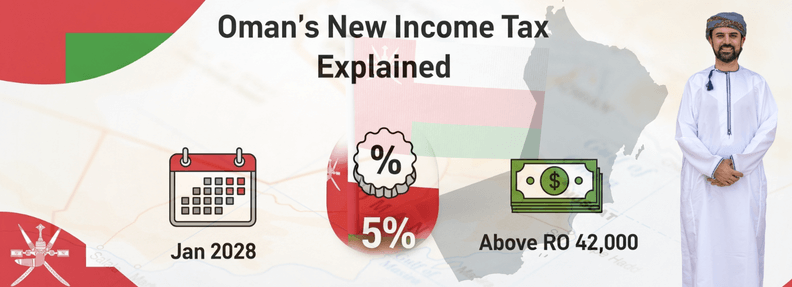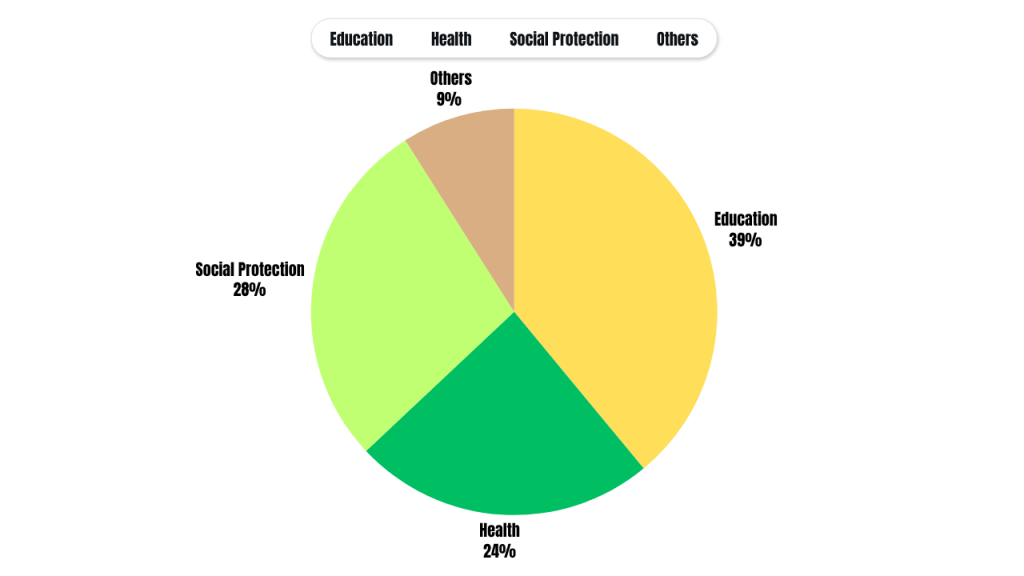
Oman's new personal income tax: What working professionals need to know
Will Oman's new personal income tax law actually affect you? Here's what the numbers really say
If you're among the thousands of working professionals in Oman wondering whether the new Personal Income Tax Law will impact your financial planning, you're asking the right question. With Royal Decree No. 56/2025 introducing a 5% personal income tax starting January 1, 2028, there's been considerable discussion—and quite a bit of confusion—about what this really means for your income.
This blog post cuts through the noise to give you the essential facts, debunk common misconceptions, and explain why this tax reform represents a strategic step toward Oman's economic future under Vision 2040.
The regulation: Essential facts
The Personal Income Tax Law, comprising 76 articles across 16 chapters¹, establishes a straightforward framework that affects only high-income earners. Here are the key details every professional should understand:
- Effective date: January 1, 2028¹
- Tax rate: 5% on taxable income¹
- Income threshold: RO 42,000 gross annual income¹
- Population impact: Approximately 99% of Oman's population will not be subject to this tax¹
The law targets specific income types as defined in the legislation and includes comprehensive deductions and exemptions that account for social considerations unique to Oman. These deductions cover essential areas such as education, healthcare, inheritance, zakat, donations, and primary housing expenses¹.
The Tax Authority has confirmed that all implementation preparations are complete, with executive regulations to be issued within one year of the law's publication in the Official Gazette¹. An electronic system has been developed to promote voluntary compliance and ensure accurate income calculation¹.
Professional perspective: Debunking common myths
Let's tackle some widespread concerns head-on with facts from official sources.
Myth 1: "This tax will significantly impact most working professionals in Oman."
Reality: The numbers tell a different story. With a threshold set at RO 42,000 gross annual income, approximately 99% of Oman's population will not pay this tax¹. The threshold was carefully established based on comprehensive income data from various government entities¹, ensuring that only high-income earners are affected.
So, what does this actually mean for the average professional? If your gross annual income is below RO 42,000, you won't pay a single baisa under this new law.
Myth 2: "The tax rate is punitive and will discourage economic activity."
Reality: At 5%, Oman's personal income tax rate remains among the lowest globally¹. Over 190 countries worldwide impose personal income taxes², and in many cases, income taxes constitute the largest component of total tax revenues². Oman's rate is deliberately competitive to maintain its attractiveness while contributing to fiscal sustainability.
But what about economic impact? The comprehensive study conducted by authorities assessed effects on GDP and 18 economic sectors, concluding minimal impact of under 1% due to the high exemption threshold and low tax rate².
Myth 3: "This will hurt foreign investment and business confidence."
Reality: The tax applies specifically to individuals, not corporate entities². Foreign investment is expected to remain unaffected since businesses continue to operate under the existing corporate tax framework². Oman's personal income tax rates remain competitive globally², maintaining the Sultanate's position as an attractive destination for international talent and investment.
Myth 4: "The government is simply looking for quick revenue without considering social impact."
Reality: The law includes extensive deductions and exemptions that reflect Oman's social priorities. These cover education, healthcare, inheritance, zakat, donations, primary housing, and other factors that matter to Omani society¹. The implementation follows an in-depth study assessing both economic and social impacts¹, demonstrating a measured approach to policy development.
Why this matters (Beyond immediate impact)
The Personal Income Tax Law serves a broader strategic purpose that extends far beyond immediate revenue generation. As Minister of Economy Dr. Said Mohammed Al Saqri explains, this measure represents "a crucial step toward enhancing financial stability and completing the fiscal sustainability framework"².
Currently, oil and gas revenues account for 68% to 85% of Oman's total public income, depending on global energy prices². While oil prices have stabilized at favorable levels recently, they remain inherently volatile². The new tax creates a diversified revenue stream that reduces this dependency and supports long-term economic stability.
The timing aligns perfectly with Oman Vision 2040's ambitious goals of diversifying income sources, with targets of 15% of GDP by 2030 and 18% by 2040¹. This isn't just about collecting revenue—it's about building a sustainable foundation for continued investment in education, healthcare, infrastructure, and social protection systems.
The 2025 budget already allocates over RO 5 billion to critical sectors:
The Social Protection Fund alone benefits over 2 million people monthly², serving as a key mechanism for household financial stability. The personal income tax will help sustain and expand these essential services while promoting wealth redistribution and enhancing social justice¹.
For working professionals, this represents an opportunity to contribute to Oman's transformation into a knowledge- and technology-driven economy while ensuring that the benefits of economic growth are shared equitably across society.
Your key takeaway
Here's what matters most for working professionals: if your gross annual income is below RO 42,000, this tax doesn't affect you at all¹. If you earn above this threshold, you'll pay a competitive 5% rate with generous deductions for essential expenses¹.
This isn't a burden—it's a strategic investment in Oman's future that ensures continued economic stability, reduced oil dependency, and sustained funding for the services and infrastructure that support your professional success. The implementation timeline gives you nearly three years to plan¹, and the Tax Authority's electronic systems will make compliance straightforward when the time comes¹.
The bottom line? Oman's Personal Income Tax Law represents thoughtful, evidence-based policymaking that balances fiscal sustainability with social considerations, positioning the Sultanate for continued growth and prosperity under Vision 2040.




